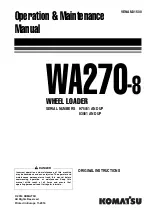
Safety First
Avant 755i 760i
14
.
Operation on uneven surfaces,
gradients, and near excavations
DANGER
Uneven ground can cause the
loader to overturn - Risk of
serious injury or death.
The
stability and the load handling
capacity of the loader are
significantly reduced on inclined
terrains and maximum lifting
capacity can be achieved only on
firm, level ground. On horizontally
tilted terrain the load must be kept
close to the ground and must
never be lifted high.
Handle heavy loads only on
even surfaces.
On uneven ground:
Extra caution is needed when using the equipment
on inclined terrains and slopes. Drive slowly
especially on inclined, uneven, or slippery surfaces,
and avoid sudden changes in speed or direction.
Operate the controls of the loader with careful and
smooth movements. Watch out for ditches, holes on
the ground, and other obstacles, as hitting an
obstacle may cause the loader to tip over.
All rated operating capacities are based on the
criteria that the loader is level on firm ground. When
the loader is operated in conditions that deviate from
these criteria (e.g. on soft or uneven ground, on a
slope, or when subject to slide loads), you must take
these conditions into account.
WARNING
Risk of tipping over on uneven
ground - Drive slow on inclined
surfaces. Always keep loads
close to the ground. Keep the
seat belt fastened to stay within
the Roll over protective
structure.
Always handle heavy
loads or only on firm, level ground
while you drive slowly with the
loader.
Uneven or inclined terrain
significantly reduces the Rated
operating capacity (see also
page 40). Remember that the
actual load carrying capacity
varies greatly according to
operating conditions and
control manner.
Use
the maximum loads
indicated in the load chart on
the loader and in this manual
as a guideline.
Keep the articulated frame of
the loader in straight position
when driving on inclined
surfaces. If you turn the loader
on an inclined surface, the
stability of the loader will
decrease in both forward and
sideways directions, and may
cause the loader to tip over.
The use of extra side weights
or ballasted tires is
recommended. See pages 63
and 38 for different options.


































